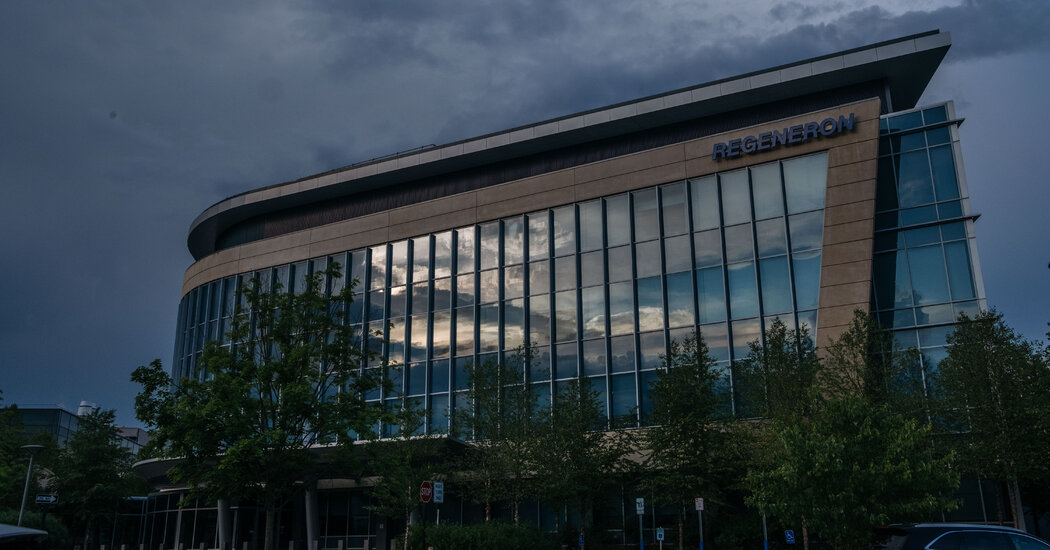On Wednesday, President Trump portrayed as a miracle “cure” the experimental antibody cocktail he took for his case of Covid-19, which had landed him in Walter Reed National Medical Military Center just days before. Mr. Trump returned to the White House three days after taking the drug.
But the antibody treatment, made by the drug company Regeneron, has not yet been proven effective against the coronavirus by rigorous clinical trials in people.
Dr. Taison Bell, a critical care physician at the University of Virginia, noted that it was not yet possible to tell whether the treatment actually “cured,” or even significantly benefited, the president. Doctors administered it to Mr. Trump alongside other therapies, including an antiviral called remdesivir and a steroid called dexamethasone. The latter is known to provoke a temporary surge in well-being.
“From a scientific standpoint, it makes it extremely hard to figure out what benefit came from which of the three medications,” Dr. Bell said.
Medical experts were also quick to point out that Mr. Trump’s touting of the treatment was at least the third time this year that the president has exaggerated the benefits of an unapproved Covid-19 therapy. He had previously promoted hydroxychloroquine and convalescent plasma, and on Wednesday advocated making the antibody treatment “free” for anyone who needed it.
Hydroxychloroquine, a malaria drug that researchers attempted to repurpose for use in people with the coronavirus, was repeatedly championed — and taken — by Mr. Trump, despite a lack of evidence that it worked. After granting emergency authorization for use of hydroxychloroquine, the Food and Drug Administration revoked it, citing studies showing that the drug did not help Covid-19 patients and could cause serious side effects in some.
Convalescent plasma is the antibody-rich portion of blood donated by people who have recovered from Covid-19. Mr. Trump pressured the F.D.A. to give the treatment emergency approval in August, even though there was no strong evidence that it benefited sick patients.
Dr. Megan Ranney, an emergency medicine physician at Brown University, said that the endless cycle of talking up new treatments — many of which might not pan out — could erode public trust in science and medicine.
“It’s like the boy who cried wolf,” she said. “It’s going to make it more difficult to get the real changers.”
Experts think monoclonal antibodies, like the cocktail taken by Mr. Trump, could fare better than hydroxychloroquine and convalescent plasma.
The treatment is “super promising, and all of us are excited from a theoretical perspective,” Dr. Ranney said. “But it’s just too early,” she added, to tell if theory will translate into practice.
Monoclonal antibodies are synthetic, mass-produced mimics of the molecules the human body produces in response to an infection. Some antibodies are powerful enough to block the coronavirus from infiltrating cells. Administered to people battling the coronavirus, the monoclonal antibodies could help naturally produced immune molecules fend off the virus.
Just days before Mr. Trump tested positive for the coronavirus and was admitted to the hospital, Regeneron announced a batch of preliminary results, collected from ongoing trials, via news release. They suggested Regeneron’s monoclonal antibody cocktail could tamp down the amount of virus found in the nasal cavity, and hasten recovery in people who had contracted the virus but hadn’t been hospitalized.
On Wednesday evening, Regeneron announced it was seeking an emergency approval from the F.D.A. for its antibody cocktail.
The data so far for monoclonal antibodies looks “very promising,” said Dr. Phyllis Tien, an infectious disease physician at the University of California, San Francisco. But it’s crucial, she added, to let the trials run to completion to fully assess safety and efficacy. Unanticipated side effects could crop up, or the treatment might not perform as well in certain people as it does in others.
Mr. Trump’s allusions to making monoclonal antibodies “free” for widespread use are also probably off base. Monoclonal antibodies are expensive and difficult to produce in large quantities. Regeneron estimated that it would initially have enough doses for only 50,000 people, though the company plans to scale up production in coming months.
What’s cheaper, Dr. Ranney said, are the many preventive strategies available to keep the virus from infecting people in the first place, such as masks and physical distancing: “How about we focus on that?”
Source: Read Full Article
